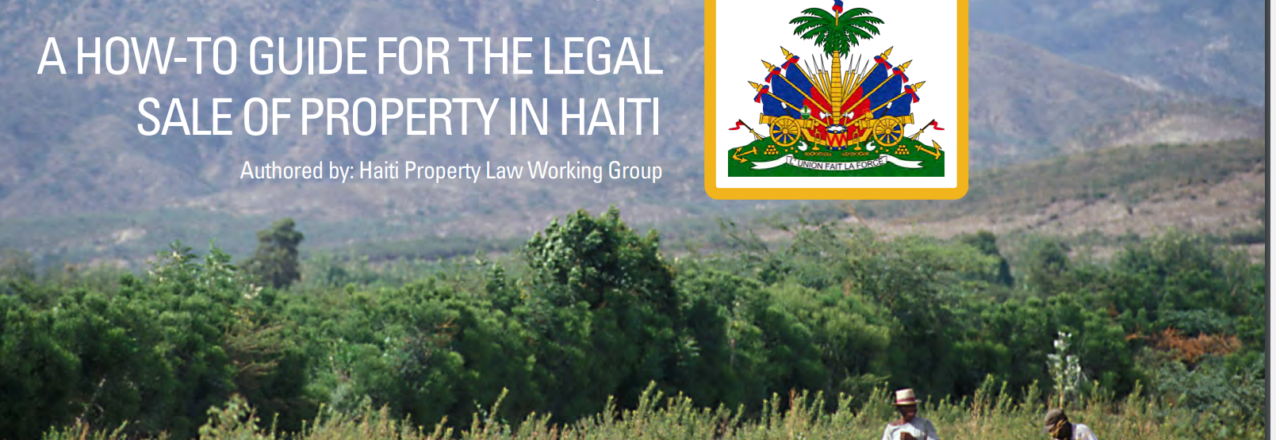A word about the manual
Buying and selling land legally in Haiti is a complex and often misunderstood process. The earthquake in January 2010 exacerbated Haiti’s land issues, hampering the country’s recovery and slowing redevelopment. This manual documents existing Haitian land laws and customary practices related to the legal sale of land, facilitating a consistent and transparent process that supports tenure security for Haiti’s residents and ultimately Haiti’s economic growth. This manual is intended to serve as an immediate tool to assist the business and reconstruction communities by clarifying the current legal and customary procedures and standardizing, in writing, the legal procedures necessary to transact and assemble land in Haiti. This manual does not cover all aspects of land transactions in Haiti. Future manuals are planned to document the regularization of land rights and eminent domain.
Our hope is that all entities — from individuals to government officials, from Haitian businesses to multinational corporations and donors — will be encouraged and enabled to engage in the legal sale of property in Haiti. Using this manual and having agreement on the legal process will increase the ability of all actors to be more successful and aware of the legal issues relating to property transfer in Haiti.
The manual was developed by the Haiti Property Law Working Group, which is made up of roughly 100 experts, practitioners, donors and government officials working to clarify Haiti’s land law in an inclusive and transparent manner. The nuanced and inclusive process of developing this manual lasted almost a year. To ensure the manual’s accuracy, drafts were circulated for comments and regional stakeholder meetings were held in Port-au-Prince, Cap- Haïtien, Les Cayes and Léogâne to solicit feedback. Stakeholder meetings included national and local government officials, notaries, surveyors, nongovernmental organizations, bilateral and multilateral agencies, and the Haitian financial and insurance sectors.
After the publication of this manual and future manuals, assuming funding remains available, the working group will develop and implement training to educate all interested parties about the manuals and to promote their broad adoption and use. Training materials will be available in French, Creole and English, and may include a series of workshops and face-to-face and online training opportunities for public officials, lawyers, notaries and surveyors, among others. The working group has begun research on other important aspects of secure tenure and land rights in Haiti, including the regularization of title and eminent domain. In addition, the working group has identified bottlenecks and challenges to the effective functioning of the Haitian property rights systems. Subject to the availability of funding, the working group will support capacity building of Haitian institutions involved in matters of property rights and secure tenure.
Introduction
In January 2010, Haiti experienced its most devastating earthquake in 50 years. One of the greatest impacts of the earthquake was the loss of homes, which left more than 1.6 million people displaced or homeless. Uncertainty and lack of transparency relating to land issues and procedures have slowed the pace of shelter development and have stifled economic development and the creation of jobs.
Land tenure issues have presented one of the biggest roadblocks to investing and rebuilding in Haiti for some time. This has been exacerbated by the earthquake. A 2009 UN-HABITAT report on Haiti states that ”due to inadequate registration and follow-up, there are no clear records of what land is owned by the state or by someone else.” Before the earthquake, less than 38 percent of all property in the metropolitan area of Port-au-Prince had properly registered titles (UN-HABITAT, 2007). Building, whether it is for shelter or commercial development, is risky when one is unable to ascertain who owns the land or who will have rights to the building when it is finished. Re-establishing residencies without security of tenure puts Haitians at the same risk for evictions and above-market rents that existed before the earthquake.
Likewise, investments in industrial and commercial development that are necessary to create jobs and stabilize the Haitian economy are limited by the lack of clarity about land ownership and lack of certainty as to the effectiveness of land transfers. Tenure security incentivizes local and national economic development as residents invest in their homes and communities and international entities invest in Haitian business opportunities. These investments create improved gross domestic product and contribute to the overall economy. They also increase the opportunity for individuals and businesses to leverage their ownership of land to access capital.
The challenges to legal and official transfer of buildings and land in Haiti are complex. Challenges include:
- A procedure that is not easily understood, especially by low-income residents.
- Unaffordable fees and expenses that can add up to 25 percent of the value of the purchase.
- Unclear requirements and inadequate documentation. For example, it is common for both parties to sign a deed of sale called acte sous-seing privé, but this is not legally accepted as a deed unless it is properly registered and transcribed by with the Office of Land Registry (Direction de l’Enregistrement et de la Conservation Foncière), which is housed within the General Tax Office (Direction Générale des Impôts or DGI), which is rare (Bloch, 1988).
- Even if registered and transcribed by a deed might not prove ownership against the claims of others, because the DGI is legally required to register and transribe all deeds brought before it.
- It is not uncommon that the party “selling” the land does not have legal title to the land either. In the case of an informal sale, this adds to the risk for conflicts about ownership down the line.


